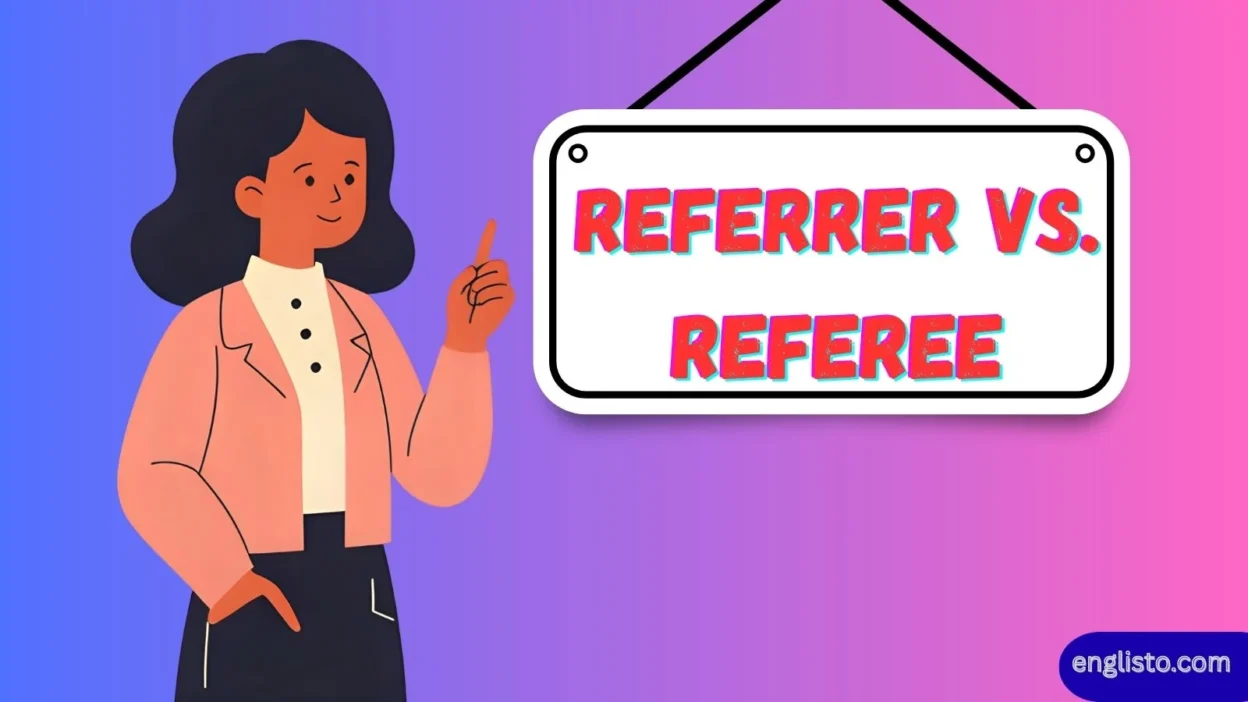Language can be tricky, especially when two words look nearly identical but carry very different meanings. Referrer and referee are perfect examples of this confusion. While they share the same Latin root “referre” (meaning to carry back or to refer), their usage in modern English stretches across business, sports, technology, and even law. Referrer vs. Referee.
If you’ve ever stumbled while writing a resume, filling in a referral form, or watching a soccer match, chances are you’ve paused and asked yourself: “Should I write referrer or referee?” This article breaks down their differences, shows real-life contexts, and provides practical examples so you’ll never confuse the two again.
What Does “Referrer” Mean?
At its core, a referrer is an individual who recommends or directs someone or something to another person, place, or service. Think of them as the initiator, the one who points someone in a particular direction.
Everyday Examples of Referrers
- A customer who shares a store’s referral link with a friend.
- A doctor who refers a patient to a specialist.
- An employer who suggests a candidate for a vacancy.
- A blogger who drives traffic to another website through backlinks.
In every case, the referrer acts as the source—the one providing or directing the recommendation.
What Does “Referee” Mean?
On the other hand, a referee refers to someone who oversees, judges, or provides an evaluation. Depending on context, it can mean:
- A sports official (soccer, basketball, boxing) who enforces the rules and makes impartial decisions.
- A professional reference—someone employers contact to confirm a candidate’s skills and experience.
- A legal or academic referee who reviews documents, research, or disputes.
The referee is always the recipient of responsibility—a neutral figure ensuring fairness, credibility, or evaluation.
Referrer vs. Referee: Quick Comparison
| Feature | Referrer | Referee |
| Role | Initiates, recommends, or directs someone | Oversees, judges, or evaluates |
| Context | Marketing, customer referrals, web traffic, job applications | Sports, recruitment, academia, law |
| Example Sentence | Sarah was the referrer who introduced me to that online course. | The referee ensured the soccer match was fair. |
| Function | Source of direction | Authority or evaluator |
| Spelling Note | Ends with -er (two R’s) | Ends with -ee (double E’s) |
Referrer in Business and Marketing
In business, referrers are the backbone of referral programs. Companies encourage customers to recommend products or services by offering incentives like discounts, bonuses, or credits.
Example:
- A ride-sharing app such as Uber gives a free ride when a referrer invites a new user.
- Affiliate marketing relies heavily on referrers who provide referral codes or URLs.
“Every satisfied customer becomes a potential brand ambassador when they act as a referrer.”
Businesses track referrers through referral codes, affiliate links, and social media shares. This allows them to measure traffic, determine effectiveness, and reward loyal advocates.
Referee in Sports
In sports, the referee ensures fair play and adherence to rules.
- In soccer, referees issue yellow and red cards for fouls.
- In basketball, they make on-the-spot decisions about penalties.
- In boxing, referees stop fights if a competitor is unfit to continue.
Referees must remain impartial, quick-thinking, and knowledgeable about the game. Without them, disputes would ruin competitions.
Quote from FIFA:
“A referee is not just a rule enforcer but the guardian of fair competition.”
Referrer in Job Applications
When applying for a job, candidates often mention a referrer—someone who directed them to the role or recommended them. Many companies even ask: “Were you referred by someone? If yes, please state the referrer’s name.”
Here’s where it gets interesting: the referrer is usually a current employee who vouches for the candidate. This benefits both sides:
- The candidate gains credibility.
- The referrer may receive a bonus if the applicant is hired.
Referee in Professional Contexts
In professional life, a referee is the person an employer contacts to verify a candidate’s qualifications, experience, and character.
Examples of referees:
- Former bosses or managers
- Teachers, mentors, or coaches
- Professional colleagues who can vouch for your skills
Key Difference: Unlike a referrer who recommends you to apply, a referee supports your application once you’ve applied.
Common Confusions and Grammar Notes
Because both words sound similar, they’re often mixed up in writing. Here’s how to avoid mistakes:
- Referrer = one who refers. Ends with “-er.”
- Referee = one who is referred to or who evaluates. Ends with “-ee.”
Think of “-er” as the doer of the action, while “-ee” is the receiver of the action.
Synonyms Table
| Word | Closest Synonyms | Context |
| Referrer | recommender, advocate, promoter, source | Marketing, referrals |
| Referee | judge, umpire, evaluator, guarantor | Sports, job applications, legal contexts |
Referrer in Web and Technology
In web technology, referrer has a special meaning. When a user clicks a link to visit a new page, the referrer URL shows which site directed the traffic.
Example:
- If you click a link on Facebook that takes you to a blog, the blog’s analytics will mark Facebook as the referrer.
This is crucial for:
- SEO (search engine optimization)
- Marketing strategies
- Tracking online campaigns
Referee Beyond Sports
While most people picture referees in sports, the word carries weight in law, academia, and disputes.
- In legal settings, a referee may oversee cases, act as a mediator, or provide a binding decision.
- In academia, referees review research papers before publication.
- In debates or competitions, referees ensure fair outcomes.
The role always revolves around impartial oversight and ensuring credibility.
Referrer vs. Referee in a Nutshell
- The referrer initiates action, recommendation, or direction.
- The referee evaluates, oversees, or verifies.
Mixing them up in professional or academic writing can lead to misinterpretations, so it’s worth getting them right.
FAQs
What is the main difference between referrer and referee?
A referrer recommends or directs someone, while a referee evaluates, oversees, or provides judgment.
Can the same person be both a referrer and a referee?
Yes. For example, a manager might refer you to a position and later serve as your referee during the hiring process.
Why does referrer have two R’s?
Because of English spelling conventions, the word keeps both R’s when adding the suffix “-er.”
What’s the role of a referee in a job application?
A referee verifies your work history, skills, and character when contacted by potential employers.
Is “referer” a correct spelling?
“Referer” (with one R) is a common misspelling but is used in web protocols like HTTP headers. In standard English, the correct spelling is referrer.
Conclusion
Words like referrer and referee highlight how English evolves across different contexts. The referrer is the initiator—the one who recommends, directs, or provides. The referee is the evaluator—the impartial judge, authority, or verifier.
Getting these distinctions right matters in business, technology, sports, and careers. Whether you’re tracking referral traffic, listing referees on a resume, or watching a game where the referee makes a call, you now know exactly who does what.
In short: The referrer sends you forward; the referee keeps things fair.



